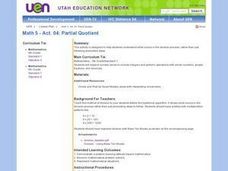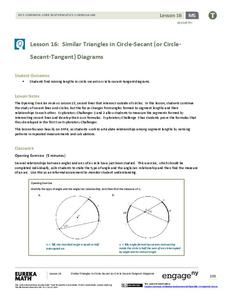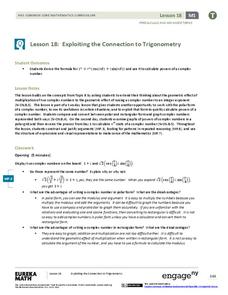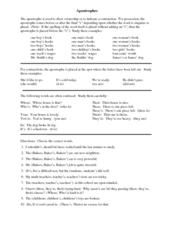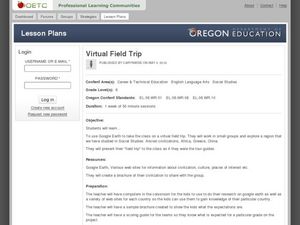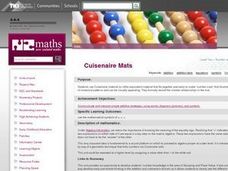Curated OER
Geo Jammin' By DeSign - Day 5, Lesson 24: Read All About It!
Students listen to The Important Thing About Quilt Design and rewrite an original version using geometric terms.
Curated OER
Divisibility Rules
In this divisibility rules worksheet, 6th graders read the divisibility rules, then apply these rules to solve 50 problems on 21 pages with answer key provided at the end.
EngageNY
Trigonometric Identity Proofs
Proving a trig identity might just be easier than proving your own identity at the airport. Learners first investigate a table of values to determine and prove the addition formulas for sine and cosine. They then use this result to...
Curated OER
Partial Quotient
Learners study what occurs in the division process, rather than just following prescribed steps. They expand number sense to include integers and perform operations with whole numbers, simple fractions, and decimals. They write a word...
EngageNY
Similar Triangles in Circle-Secant (or Circle-Secant-Tangent) Diagrams
First angle measures, now segment lengths. High schoolers first measure segments formed by secants that intersect interior to a circle, secants that intersect exterior to a circle, and a secant and a tangent that intersect exterior to a...
EngageNY
The Multiplication of Polynomials
If you can multiply multi-digit integers, you can multiply polynomials. Learners use an area model to compare multiplying numbers to multiplying polynomials. They progress to using the distributive property.
EngageNY
Exploiting the Connection to Trigonometry 1
Class members use the powers of multiplication in the 19th installment of the 32-part unit has individuals to utilize what they know about the multiplication of complex numbers to calculate the integral powers of a complex number. Groups...
Curated OER
Metrically Me!
Young scholars define the parts of a database, search strategies to locate information electronically, create/modify databases, etc. and enter data into a prepared spreadsheet to perform calculations.
Houghton Mifflin Harcourt
Look at Us!: English Language Development Lessons (Theme 1)
Start off your young English language learners with this packet of materials, which covers three weeks of instructions. After completing the unit, kids will have practiced the letters K through Z, read several story books, talked with...
Curated OER
Apostrophes and Quotation Marks
After a brief explanation of two uses for apostrophes (ownership and contractions) learners are asked to choose the correct word in 10 sentences. The same pattern is repeated for the use of quotation marks. The worksheet could be used...
National Council of Teachers of Mathematics
How Many Triangles?
For this triangles activity, learners problem solve and shade triangles within other triangles. Students complete two problems.
Curated OER
Treasure to Ship
Second graders explore and solve an algebraic word problem. They listen to a poem about pirates, describe the word problem in their own words, and independently solve the problem using colored rods to represent the pirates and treasure...
Curated OER
Performing Transformations
Students investigate the concepts relating to creating a tessellation. They include using pattern blocks in order to create interconnecting patterns. Students review translations, rotations, and reflections.
Curated OER
Symmetry, Similar & Congruent Shapes
Fifth graders identify lines of symmetry., similar and congruent shapes. They use construction paper to create their own symmetrical shapes. Students create stained glass frames containing symmetrical, congruent and similar shapes.
Curated OER
Taxi Fare
Students discuss what they know about taxis and how they charge. They read the problem and work in pairs focusing their thinking on the repeating pattern of twos. They then share their solutions and conclude with some class practice...
Curated OER
Virtual Field Trip
This hands-on resource has future trip planners analyze graphs of mileage, gasoline costs, and travel time on different routes. While this was originally designed for a problem-solving exercise using a Michigan map, it could be used as a...
Curated OER
Toothpick Tops
Students assembly tops and name them 1 - 12 so that they can compare their results. They guess which top they think will spin the best and then record data on "Toothpick Top" table. Using a stopwatch or clock to measure and record the...
Curated OER
Picture It-Fractions
Third graders draw pictures of fractions and label them with the correct fractional amount.
Curated OER
Can You Build It?
Students investigate the concept of perimeter. They design there own figure and measure the perimeter of it. The lesson is given the context of the shape being a path that is traveled by a ladybug. This provides the shape of the plane...
Curated OER
Converting Fractions to Decimals
Seventh graders take a simple fraction and give it decimal form either by the use of equivalent fractions or division with a calculator.
Curated OER
Complexity Madness
Discuss different techniques for finding the area of a geometric shape, with a great visual guide. Using a real life example, learners calculate the area of a rectangle and a square.
Curated OER
Arranging Numbers from 1 to 5
Kindergarteners arrange manipulatives or everyday objects in groups of one through five. They identify groups seen in pictures of nature and compare same numbers of different objects.
Curated OER
Cuisenaire Mats
First graders use Cuisenaire rods to study the mathematical symbols =, <, > for the relationships is equal to, is less than, and is greater than. They use the rods to show visual explanations of common number combinations.
Curated OER
Investigation Can You Build This?
Students work in small groups to explore spatial relationships while building with color cubes. Students must identify positions of blocks to partner, recreate a model, and color a sketch of their structure appropriately.





